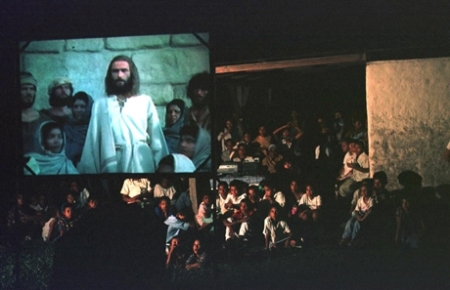'Jesus' film that has led millions to Christ will be released in 2,100th language

A global evangelism ministry will release the 2,100th foreign language translation of the 1979 movie “JESUS," focusing on a language spoken by a South American tribe known for the killing of five American missionaries in 1956.
The Jesus Film Project, a Campus Crusade for Christ International ministry devoted to sharing the film with people across the globe, will release a new translation of "JESUS" in the Waorani language, spoken by roughly 3,000 indigenous Amazonian Ecuadorians.
“Our mission is to reach everyone everywhere with the good news of Jesus. The way that we do that is through translating ‘The Jesus Film’ into heart languages and partnering with the body of Christ to show ‘The Jesus Film,’” said Josh Newell, the executive director of The Jesus Film Project, in an interview with The Christian Post.
“We work together to evangelize people and to see new churches and fellowships established as a result of that missionary activity. There's a lot of stories that come around from people who share the story of Jesus through ‘The Jesus Film,’ and incredible results and stories of people who are hearing about Jesus for the first time.”
The film, which the Jesus Film Project says has led over 200 million people to Christ worldwide, depicts the life of Jesus Christ as told in the Gospel of Luke.
Newell said the initiative to bring the film to the Waorani tribe, a people group formerly known as the Auca, is an endeavor that he anticipates will change many lives.
Newell said the relationship the indigenous group had with Christianity has been “rocky” in the past, recalling the five American Christian missionaries — Jim Elliot, Pete Fleming, Ed McCully, Nate Saint and Roger Youderian — were famously martyred by the tribe in 1956.
“The group of five wanted to reach the unreached tribe, known as the Waorani people. They spent a lot of time and effort to try to reach them, including flying over there to where the tribe was located in Ecuador with a plane,” Newell said.
“There were elaborate speaker systems calling out greetings to them, basically trying anything that they could do to meet them and bring the Gospel to them. This is a tribe that was not just unreached to the Gospel, but really was a hidden tribe in the Amazon."
Newell said that while the missionaries "finally established contact" with the tribe, the men "were speared to death five days after making contact."
News of their martyrdom became a story that has been widely retold and the subject of multiple films, namely "Beyond the Gates of Splendor" and "End of the Spear."
These films not only centered on the martyrdoms, but also how the families of the missionaries decided to live with the very tribe that had murdered their husbands and fathers, inspiring many of the Waorani people to convert to Christianity.
Since that time, ITEC, a ministry founded to serve the Waorani people and other groups, has aided in the initiative of the Jesus Film Project and connected with key leaders within the Waorani community.
Cru Ecuador will work with ITEC and other ministries to bring the Gospel message to the Waorani people.
“I think much of the older generations and many of the current generations of the Waorani people don't read or write. Having the Gospel on film is a great way to access the story of Jesus. It's a great way for their culture to be honored. Because there's not a lot of other people that are taking the time and effort to produce something in their language,” Newell said.
“It's called a heart language for a reason. Because we speak our native language and it's close to our heart. It's what we communicate in, and when we want to express our deepest fears or thoughts or feelings, we speak that tongue. This translation will be a great tool to honor the Waorani people and to express the Imago Dei and how God's image is on every person,” he added.
“I think that the most honorable thing that we can do as Christians is to share about Jesus in the language that people can most easily understand. It's the most dignified thing that we can do.”
Nicole Alcindor is a reporter for The Christian Post.





















